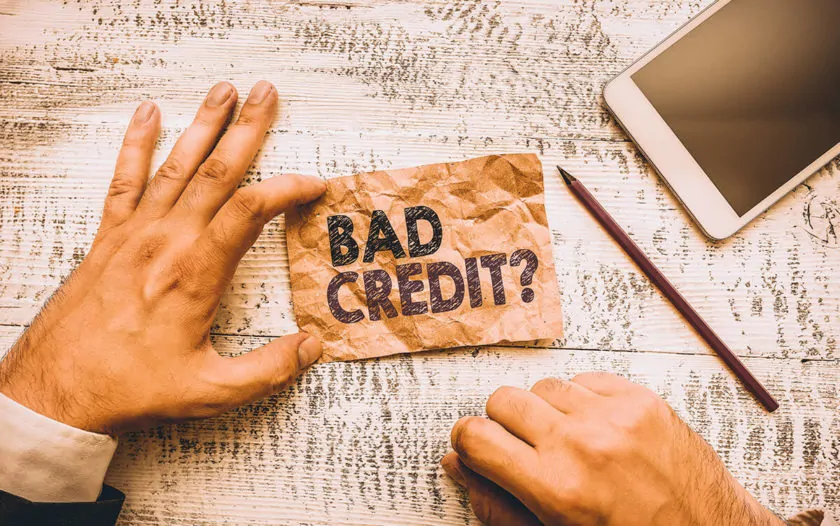What Is a Bad Credit Score?

Bad Credit Score
When someone has bad credit, it means they have a history of making late payments. They have defaulted on their loan or have failed to pay the full loan amount and interest on due time. A bad credit score can make you ineligible to borrow an instant cash loans or get a credit card. Even if you have a handsome salary, having a poor credit score can make it difficult for you to avail a salary loan or you may have to avail one at a higher interest rate.
Your creditworthiness is assessed by checking your credit score assigned by a reputed credit bureau. In India, most lenders rely on the CIBIL score. This score ranges from 300 to 900, with 300 being the lowest value and 900 representing the maximum value. It is always advised to keep your credit score as high as possible.
But most people in India suffer from a bad credit score, simply because they do not know about it. Missing out on an EMI payment even by a single day can impact your credit score negatively. Making multiple credit enquiries with different lenders at once can also lower your credit score. High utilization of your credit card is also bad for your credit score. These are very simple things that are often seen as harmless. But unknowingly you may bring down your credit score and this in turn will affect your credit eligibility.
Banks may reject your credit card requests or they may offer you secured credit cards against an FD. They will also offer a very low limit on your credit card. Similarly, your application for an instant cash loan may also be rejected, or you may get one at a very high interest rate.
What Is the Range of a Bad Credit Score?
Companies that create credit scores employ a variety of formulae or algorithms. Credit ratings and scoring methodologies come in a wide variety. That implies that each person can have many credit scores. According to the CFPB, the majority fall between 300 and 850. And pertaining to the CFPB, VantageScore and FICO provide some of the most widely utilised credit ratings.
Bad Credit Score as Per FICO
As per FICO, a credit score lower than 580 is deemed bad. According to FICO, a person with a FICO score in that range is considered to be at credit risk. Receiving approval for credit cards, mortgages, auto loans, and other financial products might be challenging at this level. Getting a low grade might also have additional repercussions. For instance, you could be required to pay a fee or make a deposit in order to apply for a credit card or home utilities.
FICO Credit Score:
- Exceptional: 800+
- Very Good: 740 – 799
- Good: 670 – 739
- Fair: 580 – 669
- Poor: less than 580
Bad Credit Score as Per VantageScore
VantageScore credit ratings vary from 300 to 850. However, it differs slightly in how it evaluates scores. VantageScore, for instance, distinguishes between credit ratings that are bad and very poor. According to the business, a credit score between 500 and 600 is considered low, while a score between 300 and 499 is considered very poor.
VantageScore Credit Score:
- Exceptional: 781 – 850
- Very Good: 661 – 780
- Good: 601 – 660
- Fair: 500 – 600
- Poor: 300 – 499
What Are the Factors Affecting Your Credit Score?
Your credit score can be harmed by a number of circumstances, which can reduce your ability to obtain a loan or credit card. Here are some of the primary issues that might lower your credit score:
- Not Monitoring your Credit Score: You should check your credit score since mistakes in your credit report might cause it to drop significantly. A faulty report of loan that you have not availed or missed payments reflecting on your account even after regular payments can affect your credit score. You must take necessary steps immediately to correct these mistakes.
- Delayed Bill Payments: The main issue that can have a significant negative impact on your credit score is not making your bill or EMI payments on time. Paying your EMIs and credit card obligations on time each month is important. If you don’t pay your bills in full, interest charges add up quickly.
- Keeping the Credit Usage Ratio High: Your credit score might be impacted negatively by exceeding your credit card limit and having a high credit usage ratio. You have to make an effort to keep your credit usage ratio low. Spending the full amount of your credit card shows that you are credit-hungry and unable to manage your financial resources.
- Failing to Check Your Credit Report: Your credit score may be negatively impacted by errors in your credit report. Therefore, it is important to routinely check your credit report. You can check your credit report on any lending app to rule out any errors.
- Applying for Multiple Loans and Credit Cards: When you apply for multiple cards and loans it gives an impression that you are credit hungry. Numerous credit applications might result in hard inquiries that could lower your credit score.
What Are the Impacts of a Bad Credit Score?
A bad credit score can affect you in many ways, some of which are given below:
- Loans and Other Borrowings: If you have a poor credit score it can increase the chances of your loan getting rejected. A poor credit score means a high risk of defaults.
- Application for Job: Potential employers may run credit reports as part of a background investigation. Using this information your employer may make a decision whether to hire you or not.
- Credit Card Limit: Your chances of being approved for cards with no fees and bigger credit limits may rise with modest improvement to your credit score.
- Difficulty in Renting: Your prospective landlord may consider your credit history when deciding whether or not to rent to you.
- Deposits on Utilities: Utility providers are permitted to and frequently run background checks on customers. If your credit history is bad, setting up utility services could involve your paying a security deposit.
- Higher Insurance Premium: Your insurer could charge you a higher premium because they see your poor credit score as a sign of overall higher risk.
Conclusion
Having a bad credit score is not the end of the world. You can always enhance your credit score later by taking some necessary actions. You need to start off by evaluating your current credit situation. Many instant cash loan providers offer free online services to check your credit score.
A bad credit score decreases your chances of getting a salary loan or any unsecured loan in future. So evaluate your credit score and start working on improving it today!







